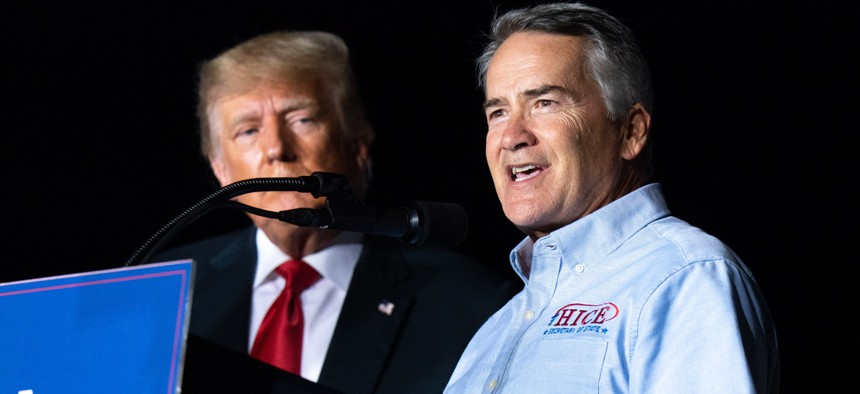Right-wing activist tees up successor to Schedule F

Rep. Jody Hice (R-Ga.) appears with former President Donald Trump in a September 2021 campaign rally in Perry, Georgia. Hice introduced legislation to restore Trump's overturned executive order making it easier to fire thousands of federal employees. Sean Rayford/Getty Images
Christopher Rufo, an instigator of culture war battles over critical race theory, wants to "centralize ideological control" of federal agencies within the Office of Management and Budget in the next Republican administration.
Christopher Rufo, the conservative activist credited with inspiring the Trump administration's executive order banning diversity training for government agencies and contractors, wants the next Republican president to exert unprecedented influence over the activities of federal agencies.
In a recent interview with the right-wing publication IM-1776, Rufo said he wants the White House to centralize "ideological control" over federal agencies, with the Office of Management and Budget playing enforcer.
Rufo said that the diversity training executive order "changed the precedent and validated bringing the culture war to the federal bureaucracy."
He wants to leverage budgets, human resources, grants and other authorities to dramatically alter the functions of the federal government and reshape the workforce.
"We could easily wipe out a significant portion of the infrastructure for the left-wing ideologies within the federal bureaucracy and within the network of federal grantees and contractors, which would shift American politics in the right direction," Rufo said.
Don Moynihan, a professor of public policy at Georgetown, told FCW that, "Rufo, and other conservatives, are deadly serious when they say they want to go after the administrative state. We have already had a preview of what this looks like under Trump's aborted Schedule F order."
In the waning months of the Trump administration, an executive order proposed to reclassify large swathes of the civil service under a new classification dubbed Schedule F that would allow for easy firing of tens of thousands of federal employees. The Schedule F order and the diversity training order were reversed on the second full day of the Biden administration.
At the time, congressional Democrats, federal employee groups and public administration experts warned that the policy would politicize federal agency employment, warning that a spoils system would return if those in power could unilaterally fire government employees deemed disloyal.
In an article published earlier this year in the Public Administration Review, Moynihan said that contemporary conversative governing philosophies are overturning a stable 20th-century consensus about the value of the merit-based civil service.
"Increasingly, the Republican Party and its donors see civil servants as antagonistic to their interests," with public sector unions considered "a political scourge to be destroyed," he wrote.
In an article in Government Executive, Moynihan said he expected a second Trump administration to focus on sweeping civil service changes sooner rather than later.
"I think the big difference is I think he would do it on Day 1, rather than waiting until the last couple of months of his term," Moynihan said.
Similar ideas are showing up in legislation and policy plans being offered by Republicans.
Sen. Rick Scott (R-Fla.), who chairs the National Republican Senatorial Committee, included a plan to "eliminate all federal programs that can be done locally, and enact term limits for federal bureaucrats and Congress," as part of a 12-point plan to "Rescue America."
Rep. Jody Hice (R-Ga.), the ranking member of the Government Operations Subcommittee of the House Committee on Oversight and Reform who recently lost a bid for the Republican nomination to serve as Georgia's Secretary of State, introduced a bill in March to enact a version of Schedule F rules on the federal expected service.






